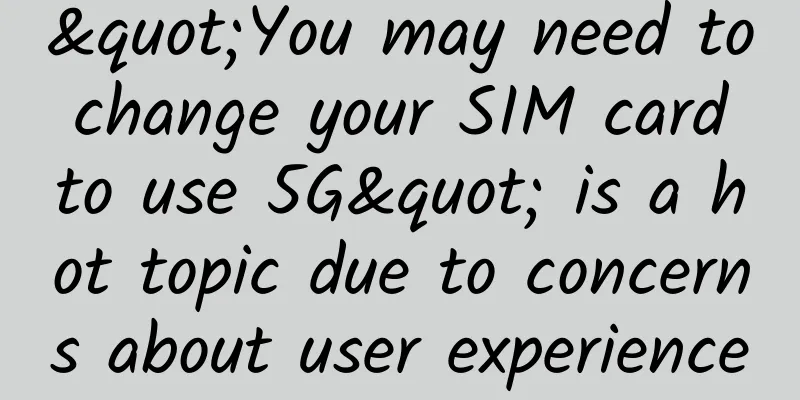"You may need to change your SIM card to use 5G" is a hot topic due to concerns about user experience

|
One person’s opinion Users hope that operators can provide better services and fulfill their previous service commitments, rather than "set up traps".
In the past two days, a report titled "Reversal! You may need to change your SIM card to use 5G, as 4G cards cannot meet 5G security requirements" has been widely circulated online. The report said that a white paper recently released by China Telecom pointed out that at this stage, users may encounter problems such as inaccurate location information when accessing the 5G network through 4G cards, which can no longer meet the information and security requirements of the 5G network. As soon as the news came out, it immediately triggered widespread concerns among users that "to use 5G, users need to change their SIM cards." China Telecom later clarified that existing 4G users do not need to change their SIM cards, but only need to switch to 5G phones to use 5G services. Its 5G SA security-enhanced SIM cards are mainly aimed at industry application scenarios with higher security enhancement requirements, such as smart manufacturing, Internet of Vehicles, telemedicine, smart cities and other fields. For many users, changing SIM cards is undoubtedly a hassle - attached to the SIM card are a lot of important personal information and communication and social resources. That is why the "5G requires changing SIM cards" has attracted public attention. China Telecom's explanation has dispelled some doubts, but some people are also worried that not changing the card means they can't enjoy the safer and higher-quality 5G services? Previously, operators vowed that users would not need to change their SIM cards or numbers to use 5G services. Now that the real "first year of 5G" has not yet ended, if there is a change in tone, it is inevitable that people will have some thoughts. In a market with asymmetric information, operators' publicity plays a great role in guiding users. Since operators have always claimed that using 5G networks requires no card or number change, users are very enthusiastic about purchasing 5G mobile phones. Statistics from the China Academy of Information and Communications Technology show that despite the impact of the COVID-19 epidemic, the cumulative shipments of 5G mobile phones in the Chinese domestic market from January to April this year still reached 30.441 million units, accounting for 33.6% of all mobile phone shipments; a total of 65 new models were launched, accounting for 47.4% of all new models. In other words, among the new mobile phone models currently on sale, nearly half are 5G phones. But even though 5G mobile phones are already selling well, due to limitations in communication infrastructure and technology, many current 5G mobile phones still have many problems in terms of high-quality experience, which is somewhat different from the ideal state. It is gratifying that in order to hedge the impact of the epidemic on the economy, my country's new infrastructure represented by 5G infrastructure construction has obtained a rare development opportunity. Problems such as insufficient base stations that restrict the development of 5G will be resolved in a relatively short period of time. However, the improvement of infrastructure construction also needs to be accompanied by high-quality 5G service levels. This includes minimizing the trouble of changing cards and numbers, so that users can enjoy 5G services more conveniently. If you don’t change your card, you can’t enjoy higher-quality and safer 5G services. So whether the cost of this replacement should be borne by the user himself or by the operator is obviously a problem worth facing. In essence, behind this heated discussion, what users hope is that operators can provide better services and fulfill their previous service commitments, rather than using a "chain trap" of changing cards, packages, and more charged items as a way to enjoy complete and high-quality 5G services. Therefore, operators should also provide users with definite and complete information to dispel various speculations and doubts caused by this as soon as possible, and stabilize user expectations through service upgrades. This will also make the development of the 5G market smoother. About the author: Li Changan (Professor at University of International Business and Economics) |
<<: 5G improves network determinism and supports digital transformation
Recommend
TD-LTE wins award: Guarding 5G and leading the world
January 9th was a day of harvest for those who ha...
All in one article: 20 industries that 5G can change
The 5G era is coming. What new changes will it br...
F5 security experts talk about DevSecOps: security by design
If someone asks, "What is changing the techn...
Difference between web scraping and web crawling
People sometimes mistakenly use the terms “web sc...
Seven key developments for SD-branch in 2020
In the next few years, the connection of remote b...
The existing network is difficult to achieve great success, will 5G be the savior of the Internet of Things?
5G is the fifth generation of mobile cellular tec...
Beavers chew through fiber optic cables, leaving Canadian community without internet for a day and a half
According to foreign media reports, a few weeks a...
Megalayer: US VPS half price from 24 yuan/month, Hong Kong VPS half price from 29.5 yuan/month, dedicated server from 399 yuan/month
Megalayer's regular VPS half-price promotion ...
[Black Friday] Virtono: €29.95/year KVM-1GB/30GB/1TB/Singapore and other data centers
Virtono has launched this year's Black Friday...
What is Open RAN?
Open RAN is an industry standard designed to powe...
2017 Global Internet Economy Conference opens in Beijing; the era of Internet of Everything has arrived
On the morning of September 5, the GIEC2017 Globa...
V5.NET is newly launched on Taiwan CN2 server, new customers get 30% off on first order
The tribe has shared information about V5.NET twi...
The use of 6GHz spectrum is hotly debated. The mainstream view is that it is most suitable for 5G.
At the 7th Asia-Pacific Spectrum Management Confe...
Discussing the future of TOSCA and NFV
Standardization and unification have great advant...
CloudCone: $9.5/year-512MB/30GB/3TB@1Gbps/Los Angeles data center
Updated again, CloudCone's Christmas promotio...








![[11.11] CMIVPS 50% off for annual VPS, 30% off for dedicated servers, 20% off for top-up](/upload/images/67cac026052b7.webp)
